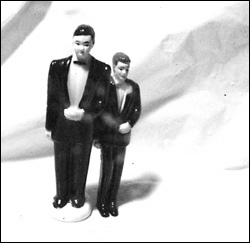So far, most of the media debate on gay marriage has been heat and noise: gay couples being joyfully wed in one or another legal enclave pitted against Christian conservative homophobes whose sky-is-falling, defend-the-sanctity rhetoric owes much to opponents who simply find gays sinful and repugnant. But as gay unions, in whatever form, draw closer to legal and cultural reality, a more nuanced opposition is gathering force. Primarily conservative, it falls in a full spectrum, from gay-friendly merging into the more rabid opponents of the religious right. The questions and challenges raised by opponents are primarily legal and cautionary—wondering what it is that will happen to an entire family legal code built on heterosexual, monogamous marriage when one of the basic assumptions of that code is changed.
For better or worse, proponents of gay marriage need to understand and be able to respond to those concerns. They include:
•The contract law model: Stanley Kurtz, writing in the conservative journal Weekly Standard, argues that gay marriage is part of a slippery slope that leads inevitably to polyamory and ” . . . a variety of relationship contracts linking two, three, or more individuals (however weakly and temporarily) in every conceivable combination of male and female.” If this is a change society isn’t ready for, Kurtz clearly isn’t ready for it; he spends much of his article detailing how polyamory advocates support gay marriage, as though this were damning evidence of a massive conspiracy against traditional values—and, in a sense, it is: What does it mean if marriage is taken past its traditional limits and derives its legal basis solely from contract law? Polyamory has implications for alimony and custody of children in divorces; for the finances and real property of common-law marriage; for the tax code; and much more. All must fundamentally change if the logic of gay marriage is followed.
•”Promoting” homosexuality: The concern is simply that with the rearrangement of so much law to accommodate it, and the stamp of “normality” attached, more and more people will try gay sex or—gasp!—”become” gay. The reasons this is seen as a bad thing, without considering any biblical sanctions, range from the traditional (i.e., yuck!) to issues of procreating for the species and public health with unsafe sex and multiple partners.
•Undermining “family values”: If people long constrained by the limitations of traditional marriage like the new, post–gay marriage version too much, what does it do to the old institutions? Conservatives worry about the social impacts of removing the norms that have traditionally accompanied marriage, particularly gender and monogamy. If marriage is seen as simply a legal contract, such vows might be easier to dishonor, or ultimately break, than when it is seen as a once-in-a-lifetime union under God. Society has already been moving in this direction for decades, with rising divorce rates and the dissolution of the traditional two-parent family as the prevalent model in America. Gay marriage, opponents fret, is more dirt in marriage’s grave.
•Assimilation: Finally, opposition to gay marriage also comes from more radical gays who worry about the opposite influence and reject what they consider a fundamentally straight institution. While a more popular criticism a decade ago, it’s still out there: Why should people who’ve spent a lifetime rebelling against society’s sexual norms suddenly aspire to embrace its most fundamental institution? This concern falls roughly into two camps: those content to let the newlyweds have their days while trying to ensure that others keep the freedom to rebel, and those who worry that marriage will undermine gay identity itself—that queerdom should not, by definition, aspire to assimilation.
One of the underpinnings of this argument is the same as the more alarmist opposition: the understanding that one of the ways in which people rebel against the sexual norm is by having multiple partners. Some radical queers, especially men, consider multiple partners, singly or in groups, as an essential part of the gay experience. That’s the polyamory bogeyman of opponents like Kurtz.
•One way or: another, the question must be answered: If marriage is to become a union between any two consenting adults, what legal limits can or should society put on that? Gender is currently one; a lack of other partners is another. A third—minimum age—is almost universally recognized as a useful limit. In the end, opponents have a point: Gay marriage is less about an inalienable right and more about a choice society has to make, a change with far-ranging consequences for law and culture. Our society may or may not be ready to change its mind.








